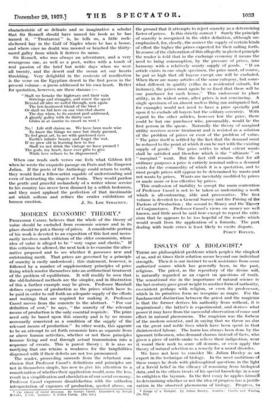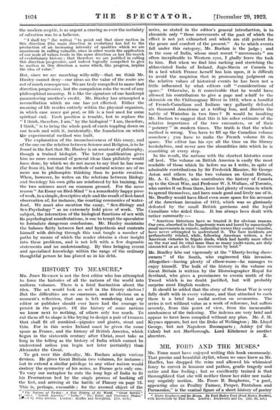ESSAYS OF A BIOLOGIST.*
TnERE are philosophical problems which perplex the simplest of us, and at times their solution seems beyond our individual strength. Then it is our instinct to seek assistance from some authorized source which has generally been, in the past, religious. The priest, as the repository of the divine will, is naturally regarded as an expert on questions of truth. The sensational rise in the importance of natural science in the last century gave great weight to another form of authority, co-existent perhaps with religion, or even its predecessor, which in its primitive form we recognize as magic. For the fundamental distinction between the priest and the magician is that the former derives his authority from without, it is inspirational ; the latter's is experimental, and derives what power it may have from the successful observation of cause and effect in natural phenomena. The magician was the forbear of the modern scientist, and in saying that we throw no slur on the great and noble lives which have been spent in that disinterested labour. The harm has always been done by the ignorant tribesmen, who demand charms instead of facts, who given a piece of rattle-snake to relieve their indigestion, wear it round their neck to scare off demons, or even apply the theory of natural selection as a remedy for a moral disorder.
We have not here to consider Mr. Julian Huxley as an expert in the technique of biology. In the most ambitious of these essays he deals with philosophical questions in the light of a fervid belief in the efficacy of reasoning from biological data, and in the others treats of his special knowledge in a way to enlighten the layman. In the first essay he applies himself to determining whether or not the idea of progress has a justifi- cation in the observed phenomena of biology. Progress, to
• Essays of a Iliologist. By Jullau Huxley. London : Chat° and Winduai f7a. 6c1.]
the modern sceptic, is as urgent a craving as ever the certainty of salvation was to a believer.
" I shall try " (he writes) " to point out that since motion in this direction (the main direction in evolution) has led to the production of an increasing intensity of qualities which we are unanimous in calling valuable, since in other words the application of our scale of values tends in the same direction as has the march of evolutionary history ; that therefore we are justified in calling this direction progressive, and indeed logically compelled to give to motion in this direction a name which, like progress, implies the idea of value."
But, since we are marching willy-nilly--that we think Mr. Huxley cannot deny—our ideas on the value of the route are not of much consequence. We are truly compelled to name that direction progressive, but the compulsion robs the word of any philosophical meaning. It is like the signature of one bankrupt guaranteeing another's credit. Mr. Huxley has attempted a reconciliation which no one has yet effected. Either the meaning of life resides entirely within the physical organism,
in which case sauve qui peut, or life is a tool used for some spiritual end. Each position is tenable, but to replace the
" I think, therefore, I am," by the biological " I am, therefore, I think," is to bring the whole pack of cards toppling down on our heads and with it, incidentally, the foundation on which the experimental method was built.
The explanation of the inconclusiveness of this essay, and of the one on the relation between Science and Religion, is to be found in the fact that Mr. Huxley is an amateur of philosophy, though a trained biologist. The latter qualification gives him no more command of general ideas than philately would
have done, by which we do not mean to say that he has none (far from it), but that the methods of natural science are of no more use to philosophic thinking than to poetic creation. When, however, he writes on the relations between Biology
and Sociology his own gifts are reinforced by his training, for 'the two sciences meet on common ground. For the same reason " An Essay on Bird-Mind " is a remarkably happy piece of work, in a simple, descriptive style and the result of first-hand observation of, for instance, the courting ceremonies of water- fowl. We must also mention the essay, " Sex-Biology and Sex-Psychology " as an extremely bold piece of work. The subject, the interaction of the biological functions of sex with its psychological manifestations, is one to tempt the speculator to formulate dangerous conclusions. Mr. Huxley maintains the balance fairly between fact and hypothesis and contents himself with driving through this vast tangle a number of paths by means of which the reader obtains a clear insight into these problems, and is not left with a few dogmatic statements and no understanding. By 'thus bringing recent and specialized knowledge within the range of the ordinary thoughtful person he has placed us in his debt.



































 Previous page
Previous page